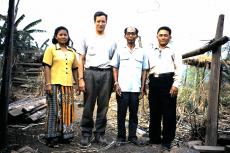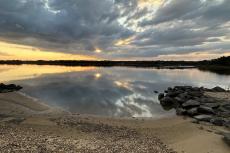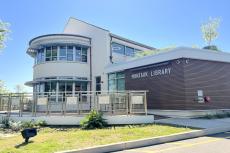Drawdown East End and Sustainable Southampton, Southampton Town's sustainability advisory committee, will co-host a virtual conference on advancing kelp farming on Long Island's East End on Tuesday at 6 p.m.
Christopher Gobler of Stony Brook University's School of Marine and Atmospheric Sciences, Sean Barrett of Dock to Dish and the Eat More Kelp public awareness campaign, Scott Bluedorn of East Hampton Town's energy sustainability committee, and Dieter von Lehsten, co-chairman of Sustainable Southampton will discuss kelp farming with two moderators, Krae Van Sickle and Mark Haubner of Drawdown East End.
Seaweed farming is the fastest growing aquaculture sector, according to the National Oceanic and Atmospheric Administration, with increasing interest in kelp farming on the South Fork. Seaweeds use the entire water column, allowing farmers to grow the crop on longlines suspended below the surface water.
"Seaweeds are incredibly efficient at sucking up carbon dioxide and using it to grow," according to NOAA. Kelp, one of the fastest growing plants in the world, takes in five times more carbon than most plants on land, and sequesters more carbon than eelgrass, mangroves, and salt marshes combined based on biomass. "That means seaweed farms can help to combat local impacts of ocean acidification."
Seaweeds also extract nitrogen and phosphorus from the water. Excessive concentrations of both are blamed for harmful algal blooms that can kill marine life and harm humans. The species has multiple uses, including as food for human consumption, as animal feed, as fertilizer, and as biofuel.
Project Drawdown, a nonprofit organization devoted to helping the world reach "drawdown," the point at which levels of greenhouse gases in the atmosphere stop climbing and begin a steady decline, has identified kelp farming as one ocean solution to reverse climate change.
At the request of John Dunne, director of East Hampton Town's shellfish hatchery, the town trustees voted earlier this month to write a letter of support seeking grant funding for a proposal to pay for a pilot kelp farming program. The project would see one or two areas of Three Mile Harbor seeded with 100-foot lines of sugar kelp in November or December. They would be removed after six months. The trustees' letter of support is directed to the town's water quality technical advisory committee, which issues funding recommendations to the town board.
Those interested in attending the virtual meeting can join it at bit.ly/3cngiQ0. The meeting ID is 850 3070 3579, and the passcode is 3302021.



